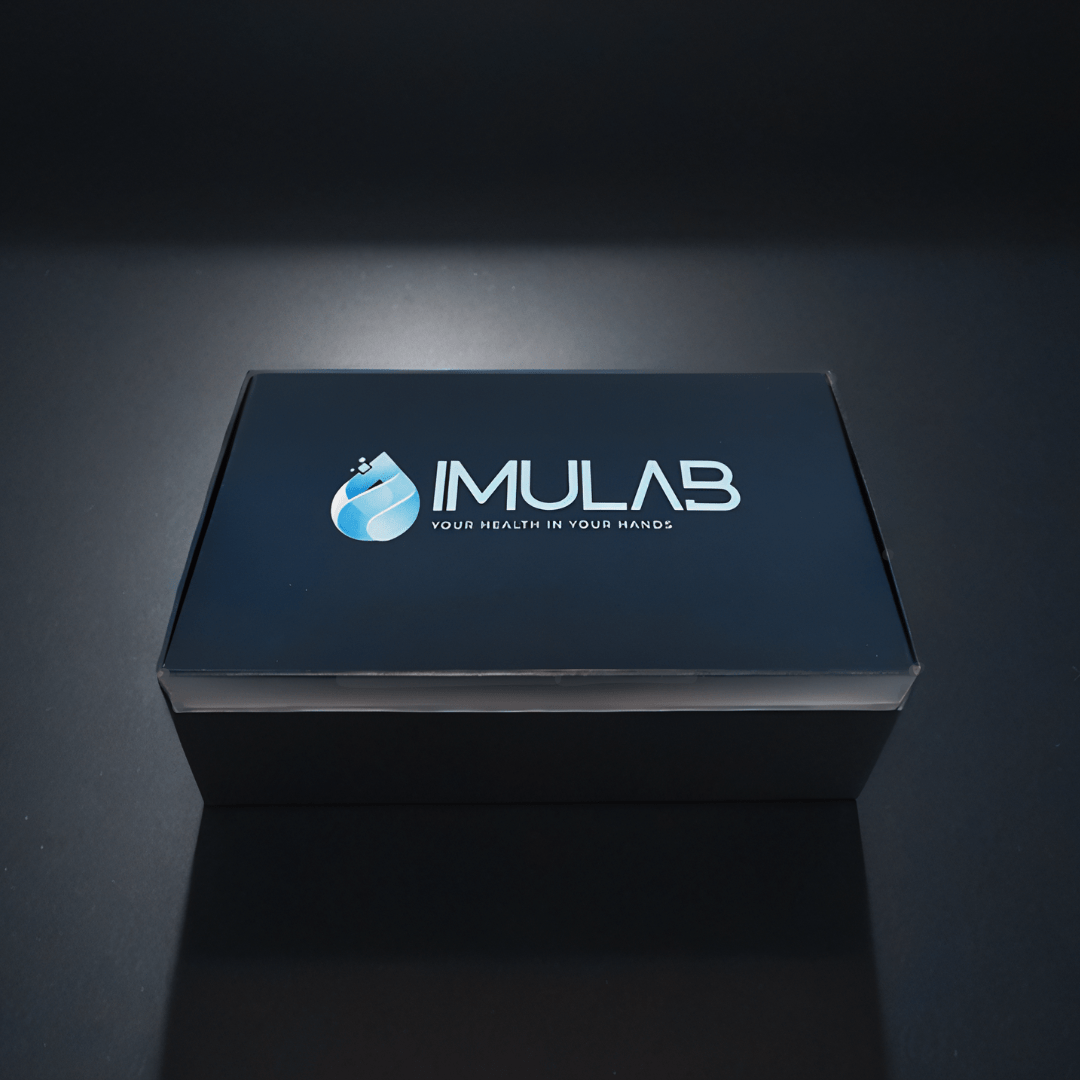IMULAB
Tiredness and Fatigue Complete (in-clinic)
Tiredness and Fatigue Complete (in-clinic)
How do you want to take your sample?
Please choose one option below-
Phlebotomy +£30.00
Venous blood collection with IMULAB Phlebotomist.
Couldn't load pickup availability
✅ Results expected within 2 working days
If you're feeling persistently tired or low on energy, our Advanced Tiredness & Fatigue Blood Test can help identify common factors that may contribute to these symptoms, offering valuable insights to support your well-being.
What Does This Test Measure?
This comprehensive blood test checks key health markers often linked to fatigue and low energy, including:
- Anaemia markers: Assess red blood cell levels and iron status.
- Vitamin D levels: Vital for energy and overall health.
- Vitamin B12: Essential for red blood cell production and preventing anaemia.
- Thyroid function: Hormones that regulate metabolism and energy.
- White blood cells: To check for signs of recent infection.
- Diabetes markers: To rule out blood sugar-related fatigue causes.
Important Note:
Fatigue and low energy can result from multiple causes, including lifestyle, stress, mental health, or underlying medical conditions. While this test provides valuable insights into common contributing factors, it cannot identify the exact cause of fatigue on its own. If you're concerned about ongoing tiredness, it's important to consult a healthcare professional for a full assessment.
Who Is This Test For?
- Individuals experiencing persistent tiredness or low energy
- Those wanting to rule out common deficiencies or imbalances
- Anyone looking to understand their thyroid, vitamin, and iron levels
What You’ll Gain:
- A detailed overview of key health markers related to energy and fatigue
- Information to help guide lifestyle, dietary, or medical interventions
- A starting point for discussions with your healthcare provider
Convenient Testing Options:
- Superdrug Partner Clinics: Accessible across the UK for professional sample collection.
- Home Nurse Visit: Arrange for a nurse or your healthcare professional to collect a venous sample in the comfort of your home.
Fast & Secure Results:
Your results will be securely delivered via our online patient portal, typically available within two working days from receipt at our laboratory.
Take the first step towards understanding your energy levels—order your Advanced Tiredness & Fatigue Blood Test today.


What's included in this test?
Red blood cells
Haemoglobin
Haemoglobin is a protein found in red blood cells that is responsible for transporting oxygen from the lungs to different tissues and organs throughout the body. It also plays a crucial role in carrying carbon dioxide, a waste product, from the tissues back to the lungs for elimination. The production and maintenance of healthy haemoglobin levels are essential for overall health and well-being.
When haemoglobin levels are low, a condition known as anemia can occur. Anemia can have various causes, including nutritional deficiencies, chronic diseases, blood loss, or impaired production of red blood cells. Symptoms of anemia may include fatigue, weakness, shortness of breath, pale skin, dizziness, and irregular heartbeats. It can lead to a reduced capacity to deliver oxygen to the body's tissues, affecting overall energy levels and organ function.
On the other hand, high levels of haemoglobin, referred to as polycythemia, can occur in certain conditions such as lung disease, congenital heart defects, or bone marrow disorders. Polycythemia can make the blood thicker and more viscous, which may lead to complications like blood clots, heart attacks, or strokes. Symptoms may include headache, dizziness, fatigue, blurred vision, and increased blood pressure.
Maintaining optimal haemoglobin levels is important for proper oxygen transport and overall health. If you suspect any abnormalities in your haemoglobin levels, it is recommended to consult a healthcare professional for appropriate evaluation, diagnosis, and treatment.
Haematocrit
Red cell count
The Red Blood Cell (RBC) Count is a test that evaluates the quantity of red blood cells present in the blood. Red blood cells play a crucial role in transporting oxygen from the lungs to the body tissues, where it is utilized for various energy processes like respiration and movement. They also carry carbon dioxide from the body tissues back to the lungs, where it can be removed from the body through exhalation.
MCV
MCH
MCH stands for mean corpuscular haemoglobin and measures the average amount of haemoglobin in each of your red blood cells.
MCHC
RDW
White blood cells
White cell count
Neutrophils
Neutrophils are the predominant type of white blood cell in the human body that assist in combating infections. They are the primary defence mechanism that detects and destroys pathogens before other types of white blood cells are activated. If the number of neutrophils in the blood is reduced, the body becomes more susceptible to illnesses and infections.
Lymphocytes
Lymphocytes are a group of white blood cells that play a crucial role in the body's immune system by fighting against bacterial and viral infections. They are specialized white blood cells that can recognize and differentiate between different foreign organisms that invade the body. Apart from their role in fighting infections, they also produce antibodies and memory cells that can help prevent future infections from the same germ. Lymphocytes consist of T cells, B cells, and natural killer cells.
Monocytes
Eosinophils
Basophils
Iron profile
Iron
Iron is a mineral that is necessary for the body to function properly. It is an essential component of haemoglobin, a protein present in red blood cells that transports oxygen throughout the body. Insufficient iron in the body can lead to a decrease in haemoglobin levels and result in symptoms such as fatigue, dizziness, and shortness of breath. However, measuring serum iron alone may not provide an accurate picture of iron levels as it can be influenced by the recent intake of iron-rich foods. Therefore, iron is typically evaluated alongside other markers in an iron status test.
TIBC
Total iron-binding capacity (TIBC) is a laboratory test that measures the amount of iron that can be carried by proteins in the blood that bind to iron, such as transferrin. It reflects the body's capacity to bind iron and transport it through the bloodstream to where it is needed.
Transferrin saturation
Ferritin
Thyroid hormones
TSH
Thyroid stimulating hormone (TSH) is a hormone produced by the pituitary gland that regulates the production of thyroid hormones thyroxine (T4) and triiodothyronine (T3) by the thyroid gland. TSH levels increase when thyroid hormone levels are low, and decrease when thyroid hormone levels are high. Abnormal TSH levels can indicate problems with the thyroid gland, such as under or overproduction of thyroid hormones. It can also be a result of pituitary gland disorders.
Free thyroxine
Thyroxine (T4) is one of the two primary hormones produced by the thyroid gland. It plays a vital role in regulating metabolic processes in the body. T4 is mostly bound to carrier proteins in the blood, and only a small amount of it exists in its free or unbound form. In contrast to free T3, free T4 is relatively inactive, but it is still essential for normal body function. When the body requires thyroid hormone, free T4 is converted to the more active form, free T3.
Vitamins
Vitamin B9 (Folate)
Vitamin B12 Active
Vitamin B12 plays a critical role in the production of red blood cells, which carry oxygen throughout the body. It also supports metabolism and the nervous system, and prolonged deficiency of vitamin B12 may lead to nerve damage. While vitamin B12 is predominantly present in animal-based foods, some vegetarian and vegan products, such as plant-based milks, are now fortified with this vitamin.
Vitamin D
Vitamin D is a hormone that is primarily synthesized in the skin upon exposure to sunlight. It is important for maintaining bone health as it aids in calcium absorption from the intestines. Apart from this, vitamin D also plays a role in immune function and is associated with various chronic diseases and mental health. In the UK, many people have low levels of vitamin D, which can cause symptoms such as muscle weakness, fatigue, and mood swings. People with dark skin and those who do not spend much time outdoors are particularly at risk of low vitamin D levels. Vitamin D can also be obtained from food, especially oily fish, eggs, and fortified foods. However, food sources may not be sufficient to correct a deficiency in vitamin D.
Inflammation
hs-CRP
Diabetes
HbA1c
Haemoglobin A1c (HbA1c), also known as glycated haemoglobin, provides a measure of average glucose levels in the blood over a longer period than a simple blood glucose test. When glucose attaches to the haemoglobin in red blood cells, it forms glycated haemoglobin, which can be used to estimate the average level of sugar in the blood over the preceding 2-3 months, as red blood cells have a lifespan of around 12-16 weeks.
Clotting status
Platelet count
Sampling special instructions
Prepare for your Advanced Tiredness and Fatigue Blood Test by following these instructions and those included within your test kit. Please take your sample before 10am. Take this test when any symptoms of short-term illness have settled. You should take this test before you take any medication, vitamin or mineral supplements. Do not take biotin supplements for two days before this test, discuss this with your doctor if it is prescribed. Do not take vitamin B12 for two weeks prior to this test. If your B12 is prescribed ask your doctor whether to stop.


